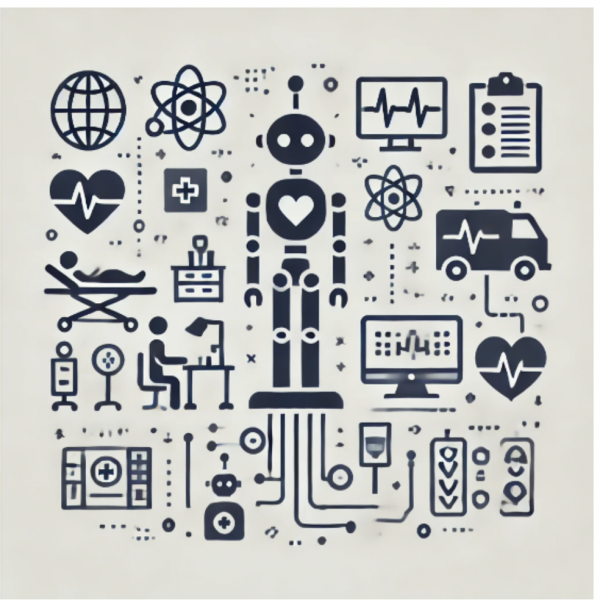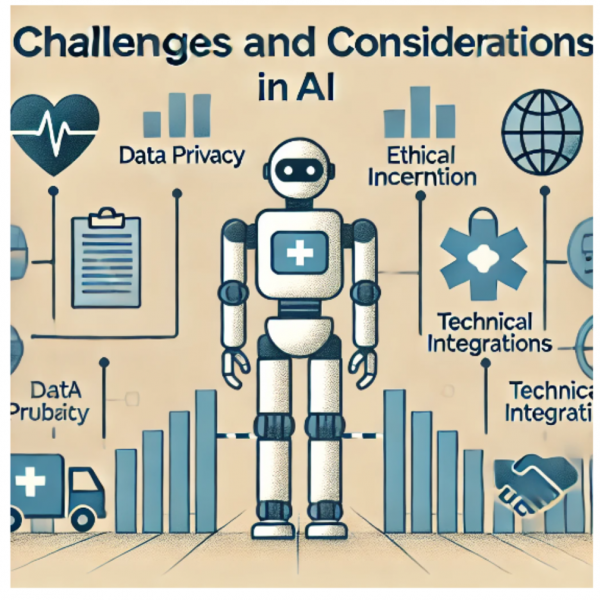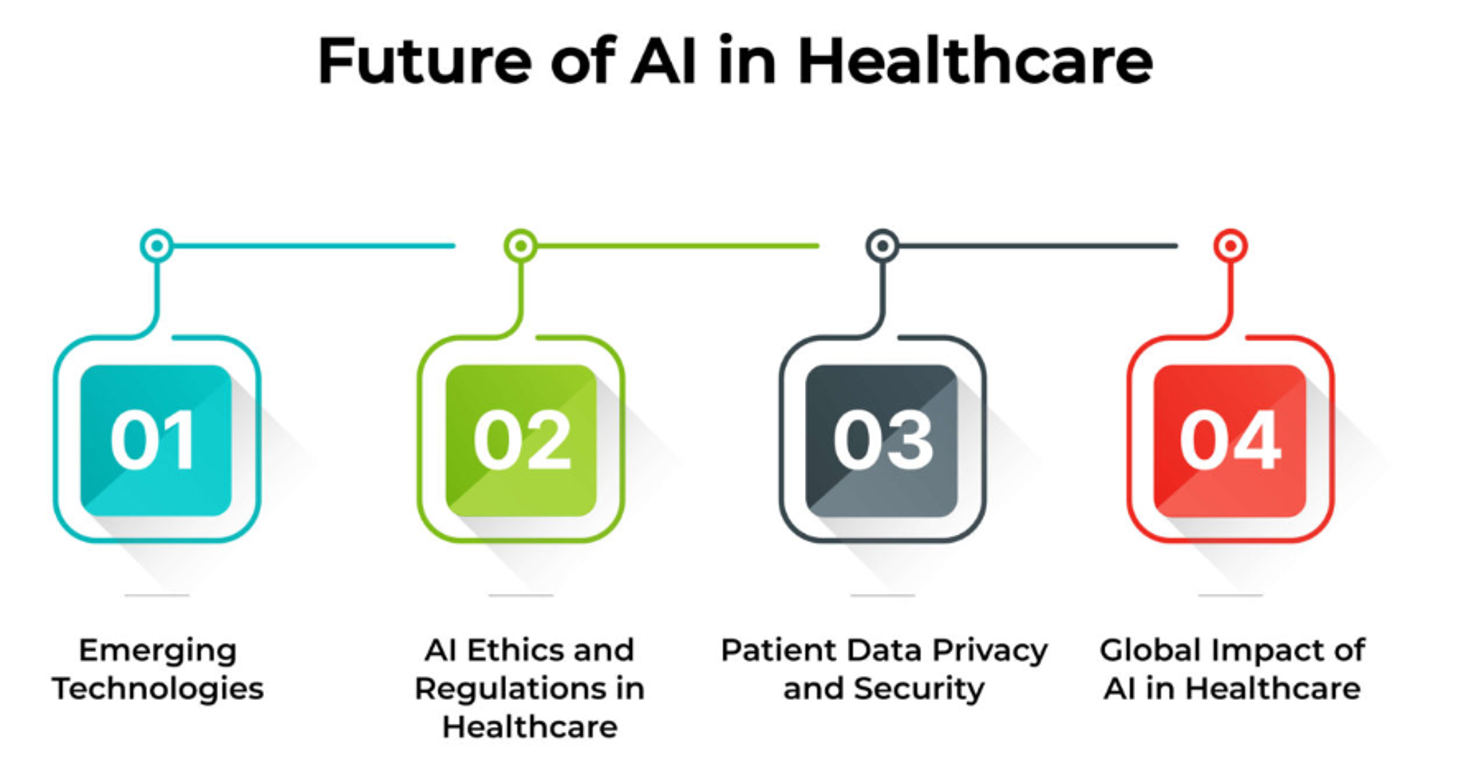table of contents
- Introduction
- Applications of Artificial Intelligence in Healthcare
- Diagnostics and Imaging
- Drug Discovery and Development
- Virtual Health Assistants and Telemedicine
- Electronic Health Records (EHRs)
- Detecting health issues before they reach critical stages
- What are the main challenges that hinder ethics of AI in healthcare?
- Future Of AI in HealthCare
- Conclusion
- FAQs
How AI is Transforming Healthcare Applications and Ethical Considerations

Introduction
It may surprise you to find out that artificial intelligence is not just an idea for the future of technology but is now changing healthcare. Artificial intelligence (AI) is transforming healthcare, from helping surgeons in the operating room to providing real-time answers to patient inquiries. The AI healthcare industry was estimated to be worth 374.7 million USD in India alone in 2023, and by 2032, it is expected to rise to 6.9 billion USD. However, these rapid developments raise certain important questions, such as the extent to which AI might affect healthcare and the ethical challenges it raises.
Applications of Artificial Intelligence in Healthcare

Diagnostics and Imaging
AI is transforming diagnostics and medical imaging, especially in fields like radiology and pathology. Machine learning algorithms are proving more accurate than human specialists in detecting abnormalities such as tumors, fractures, and neurological issues from medical images like X-rays, MRIs, and CT scans.
By reducing human error and offering second opinions, AI enables earlier disease detection, leading to better patient outcomes. India’s diagnostics sector is valued at $55 billion in 2023, is set for rapid growth, expected to reach $98 billion by 2028, positioning AI as a key driver of innovation in healthcare.
- PathAI is one example of how artificial intelligence may be used to enhance pathology diagnosis. Physicians may make more informed treatment decisions by using PathAI to improve the accuracy of illness diagnosis in biopsy samples. This results in more accurate and dependable diagnoses. This technology makes the diagnostic procedure more efficient and improves patient care.
Drug Discovery and Development
AI is transforming drug discovery by rapidly predicting drug candidates and their interactions with biological targets, accelerating the development process. This speed allows for quicker responses to emerging health threats, such as new diseases, and helps deliver more personalized treatment options.
AI enhances patient-provider communication, supporting shared decision-making for tailored care. The global drug discovery market is projected to reach $71 billion by 2025, up from $35.2 billion in 2016. The largest segment, small molecule drug discovery, is set to hit $48 billion by 2025, driving significant growth in this innovative field.
- A leading example is Insilico Medicine, which uses AI to identify promising drug candidates and optimize the entire drug development process. Their technology reduces the time and cost associated with traditional research, bringing innovative treatments to market faster and improving healthcare outcomes overall.
Virtual Health Assistants and Telemedicine
AI is revolutionizing drug research by predicting drug candidates and their interactions, drastically shortening development timelines and enabling quicker responses to health crises. It also enhances personalized treatment options, empowering physicians to have more informed, patient-centered discussions. AI is driving faster, smarter, and more accessible healthcare solutions globally, with over 116 million virtual doctor consultations by 2024.
- An example is Buoy Health, an AI-powered virtual health assistant that helps users assess symptoms and guides them to the appropriate care. It uses AI to provide personalized health recommendations, improving access to timely medical advice and supporting patient decision-making. Buoy Health’s platform enhances healthcare delivery by integrating AI-driven insights with user-friendly virtual assistance.
Electronic Health Records (EHRs)
AI-powered Electronic Health Records (EHRs) are revolutionizing healthcare by streamlining data management and providing instant, secure access to patient information. Integrated with cloud technology, these systems enable real-time updates and remote collaboration, ensuring healthcare professionals stay connected seamlessly.
With machine learning algorithms, AI-driven EHRs analyze historical data, aiding in disease diagnosis and offering decision support for better care outcomes. They also reduce administrative burdens, minimize errors, and improve overall care quality. The global EHR market, projected to reach $40 billion in 2024, has nearly doubled in size since 2015, highlighting the growing impact of AI in healthcare.
- A prime example is athenahealth, which offers AI-powered EHR solutions tailored for large healthcare organizations. Their platform improves efficiency by automating tasks, providing cloud-based access, and supporting better patient outcomes through advanced data analytics and real-time collaboration.
Detecting health issues before they reach critical stages
AI models can analyze current diagnoses and historical health patterns to detect potential issues early, enabling medical professionals to take proactive steps before conditions worsen. This early detection reduces the risk of severe illnesses, allowing for timely interventions and better patient outcomes. By identifying problems early, AI supports a more efficient healthcare delivery system, improving overall care quality.
- An example is Ada Health, an AI-powered app that functions as a symptom checker and triage tool. It evaluates users’ symptoms and offers personalized health information, helping them decide whether medical attention is needed. Ada Health empowers users with actionable insights, streamlining access to care and enhancing preventive healthcare by guiding patients toward timely and appropriate medical interventions via mobile applications.
What are the main challenges that hinder ethics of AI in healthcare?
While AI holds tremendous promise in healthcare, its adoption raises several ethical challenges that must be addressed to ensure patient safety and trust.

- Data Privacy and Data Security: AI systems rely on vast amounts of personal health data to function effectively. This raises concerns about the privacy and security of sensitive medical information. Ensuring that data is anonymized and protected from breaches is essential, especially as cyberattacks on healthcare application in India become more frequent.
- Bias in AI Algorithm: AI algorithms are only as reliable as the data they are trained on. Biased data can perpetuate healthcare inequalities, leading to disparities in care for underrepresented demographics. For instance, an AI system trained primarily on one group may not perform well for others. As a healthcare app development company, we prioritize using diverse and representative datasets to create equitable and effective AI solutions in healthcare.
- Accountability and Transparency: AI systems are often referred to as “black boxes” because their decision-making processes can be opaque. In healthcare, where decisions can mean the difference between life and death, it is important that AI systems are transparent and explainable. Doctors and patients need to understand how AI arrived at a particular diagnosis or recommendation to ensure trust and accountability.
- Ethical AI Usage and Patient Consent: Artificial Intelligence implementation in healthcare must prioritize patient consent and autonomy. Patients should be informed about how AI will be used in their diagnosis or treatment and can opt-out if they are uncomfortable. Furthermore, ethical frameworks should ensure that AI is used to enhance patient care, not replace the human touch that is vital in healthcare technology.
Future Of AI in HealthCare
AI in healthcare has the potential to significantly improve patient care, diagnosis, and treatment in the future. Algorithms based on AI development are capable of accurately analyzing medical images and quickly identifying conditions to increase diagnostic precision. AI technology-powered techniques improve histopathology, and predictive models can forecast disease outbreaks and provide individualized treatments by examining genetic data, medical history, and lifestyle factors.

While wearable technology tracks health in real-time and facilitates early interventions, AI-integrated telemedicine platforms allow for remote consultations. With customized recommendations and instructional materials, AI enhances managerial efficiency and patient involvement.
AI-assisted robots improve accuracy in surgery by providing stability and immediate feedback. Furthermore, AI helps with medication research and healthcare policy by analyzing large databases and revealing key insights. AI will become steadily integrated with health care as it expands, from better data management to earlier detection of diseases like cancer or heart problems that will enhance patient outcomes. AI will play a key role in the future of healthcare development because of the potential to improve patient health while also saving the system a significant amount of money.
Conclusion
In conclusion, the transformative potential of artificial intelligence in healthcare cannot be overstated. As AI development continues to enhance diagnostics, treatment options, and patient care, addressing the associated ethical challenges is essential. By prioritizing data privacy, reducing bias, ensuring transparency, and obtaining patient consent, we can build trust in AI implementation in healthcare development. Embracing these principles will enable India to harness the full benefits of AI in healthcare, ultimately leading to improved patient outcomes and a more efficient healthcare system.
If you want to transform your healthcare business with cutting-edge AI technologies, contact Codestore now. We have a team of dedicated developers for custom healthcare app development that improve patient care and expedite operations. Our expertise spans predictive analytics, diagnostics, and personalized health solutions. Connect with us at /contact-us/ to discuss how AI can revolutionize your healthcare business. Let’s innovate for a healthier future!
FAQs
What is the future of Ai in Healthcare?
AI’s future in healthcare includes personalized treatment, predictive analytics, enhanced diagnostics, and improved patient care through advanced machine learning and data-driven insights.
What are the pros of AI in Healthcare?
AI enhances diagnostics, accelerates research, reduces errors, improves patient outcomes, and streamlines healthcare operations, that are also cost-effective, efficient, and offer high-quality care.
How many Hospitals use Ai in Healthcare?
Thousands of hospitals globally are adopting AI for diagnostics, patient care, and operational efficiencies, with usage increasing as technology advances.
Why AI in healthcare?
AI improves accuracy, efficiency, and accessibility in healthcare for better diagnostics, personalized treatment, and proactive patient care.
How AI helps in healthcare?
AI aids in diagnostics, predictive analytics, patient monitoring, and administrative tasks. It also reduces workloads and enhance decision-making.
What are the roles of Ai in Healthcare?
AI plays roles in diagnostics, personalized medicine, patient monitoring, medical imaging, drug discovery, and predictive analytics, enhancing overall care quality.




